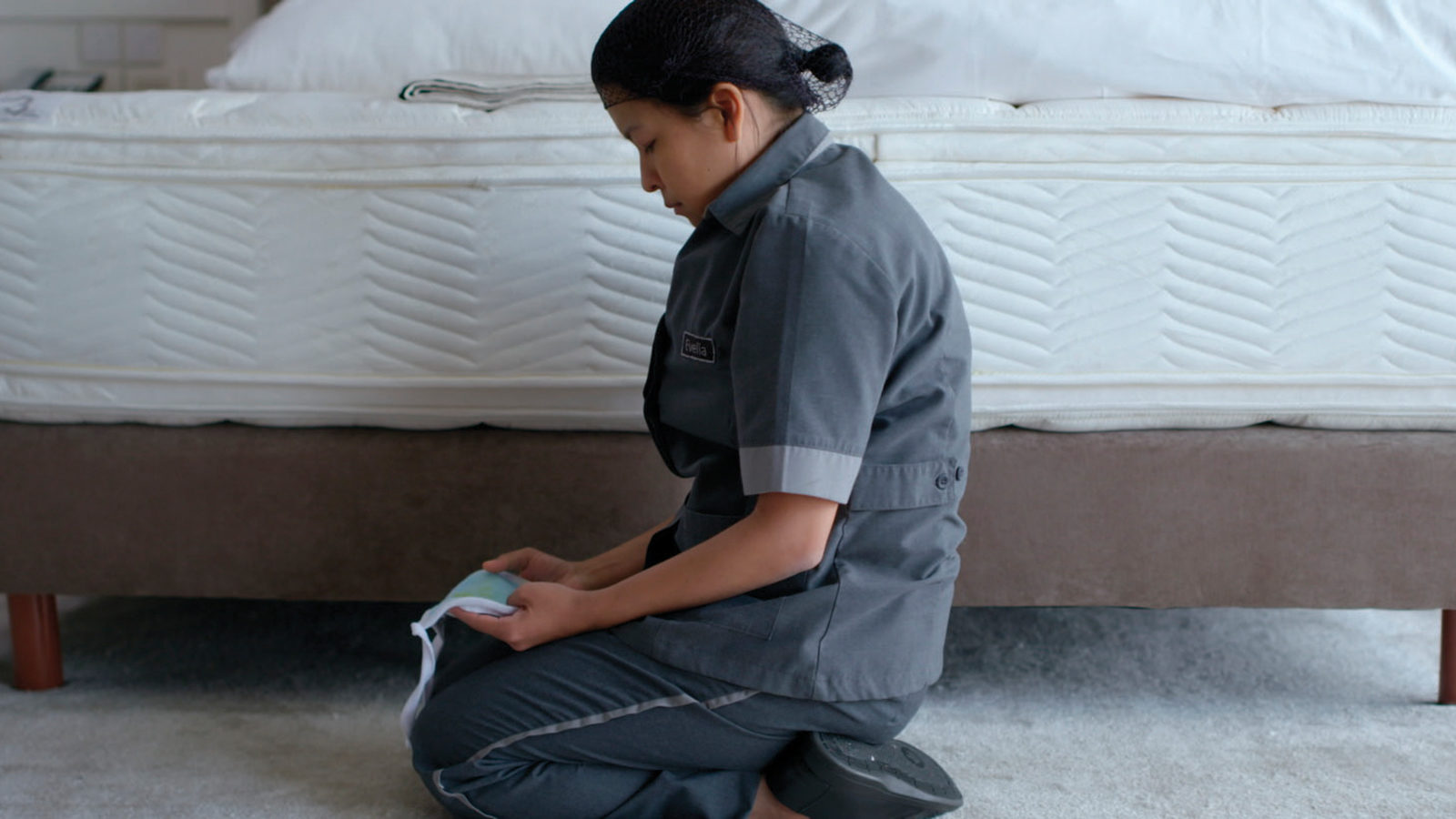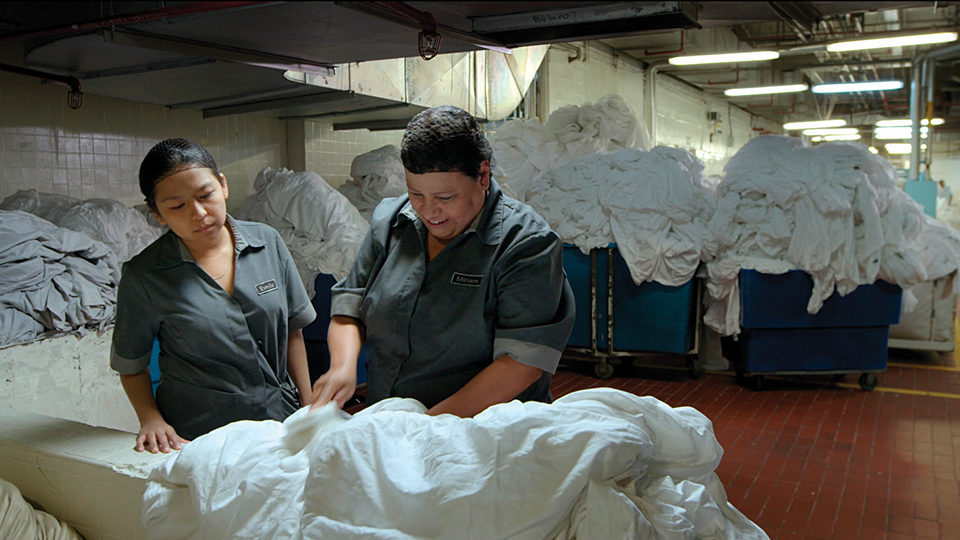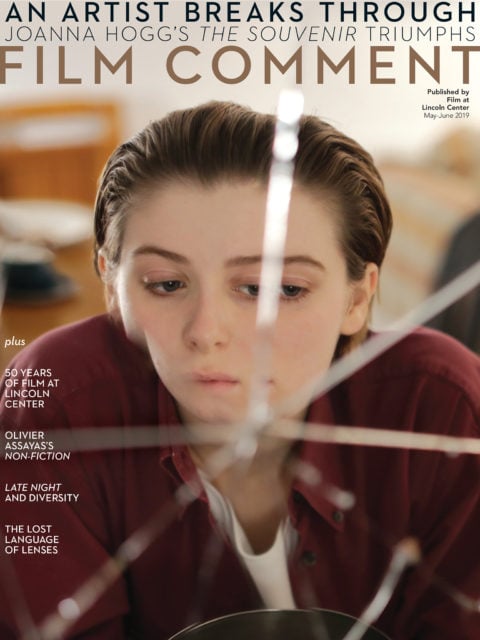By Lawrence Garcia in the May-June 2019 Issue

The Big Screen: The Chambermaid
(Lila Avilés, Mexico, Kino Lorber, Opening June 26)
The ins and outs of hotel work, as explored in films as disparate as Benoît Jacquot’s A Single Girl (1995) and Pascale Ferran’s Bird People (2014), take on an uncanny resonance in Lila Avilés’s The Chambermaid. In this precisely scaled debut feature, the site of such labor is the Hotel Presidente Intercontinental, a luxurious lodging along the Paseo de Reforma in Mexico City where Eve (Gabriela Cartol), a diminutive 24-year-old housekeeping attendant (or camarista), dispatches her duties with brisk efficiency. Though the film might seem like yet another socially conscious but dully programmatic festival-circuit object, Avilés differentiates it with her talent for droll observation and keen eye for the unfamiliar. Using foreboding static frames and claustrophobic shallow-focus shots, the Mexican director renders the hotel’s oppressively modernist spaces—emblematic of increasingly globalized networks of wealth and power—with an appropriate alienness. It’s as though we’re seeing them for the first time.

The Chambermaid (Lila Avilés, 2018)

From the May-June 2019 Issue
Also in this issue
Avilés made The Chambermaid after directing a stage play on the same subject, which in turn was inspired by French artist Sophie Calle’s The Hotel, a photography book drawn from her stint at a Venetian hotel in 1981. But Avilés’s natural filmmaking talents are on full display from the jump: a fixed composition of a cluttered suite sees Eve’s metronomic activity interrupted by her belated discovery of the room’s occupant, a charged turn that’s indicative of the director’s willingness to generate tension through judicious withholding. Informed by Avilés’s years-long research in the hospitality industry, The Chambermaid maintains its granular, procedural attention to service work without ever leaving Eve’s side or the confines of the Hotel Presidente.
Cartol as Eve appears in every scene of the film, and with few exceptions maintains a studied composure even when buffeted about by all manner of slights, blows, and casual indignities. Eve’s halting interactions with her co-workers and the hotel guests play out in mostly disconnected scenes that together chart a cyclical progression, but there’s also a through line in the form of her personal and professional aspirations: to spend more time with her 4-year-old son Ruben (never seen); to acquire the expensive red dress left in the guest lost-and-found; to obtain her GED with the help of classes offered by the hotel; and to work her way up to the building’s penthouse floor.
Eve’s tireless negotiations of these challenges constitute the better part of the film, though Avilés offsets the dogged proceedings with a welcome strain of absurdist humor. Eventually though, the script takes a pessimistic turn that isn’t implausible so much as dismayingly pro forma. Avilés’s film is decidedly not emancipatory or escapist in the way of, say, Ferran’s fantastical, shape-shifting Bird People, with which it nonetheless shares an underlying impulse to defamiliarize. And it doesn’t have to be. But in stark contrast to what came before, such maudlin developments—in particular, an implied betrayal on the part of Minitoy (Teresa Sánchez), an older female co-worker of Eve’s—are still cause for disappointment.
Given its setting and subject matter, The Chambermaid invites comparison to Alfonso Cuarón’s Roma, not least because both films include meaningful skyward pans that show their respective protagonists ascending toward a building rooftop. But whereas Cuarón ends his monochrome memory play on this beatific note of contemplation, Avilés brings her camera back down in a seeming rejection of such poetic grace. The film’s closing image, which offers a rare view of the outside world from the hotel lobby, confirms Avilés’s (literally) ground-level commitment to probing the material limits of her chosen milieu—which, for so many, is no real choice at all.
Lawrence Garcia is a Vancouver-based film writer and a frequent contributor to Cinema Scope and MUBI Notebook.







